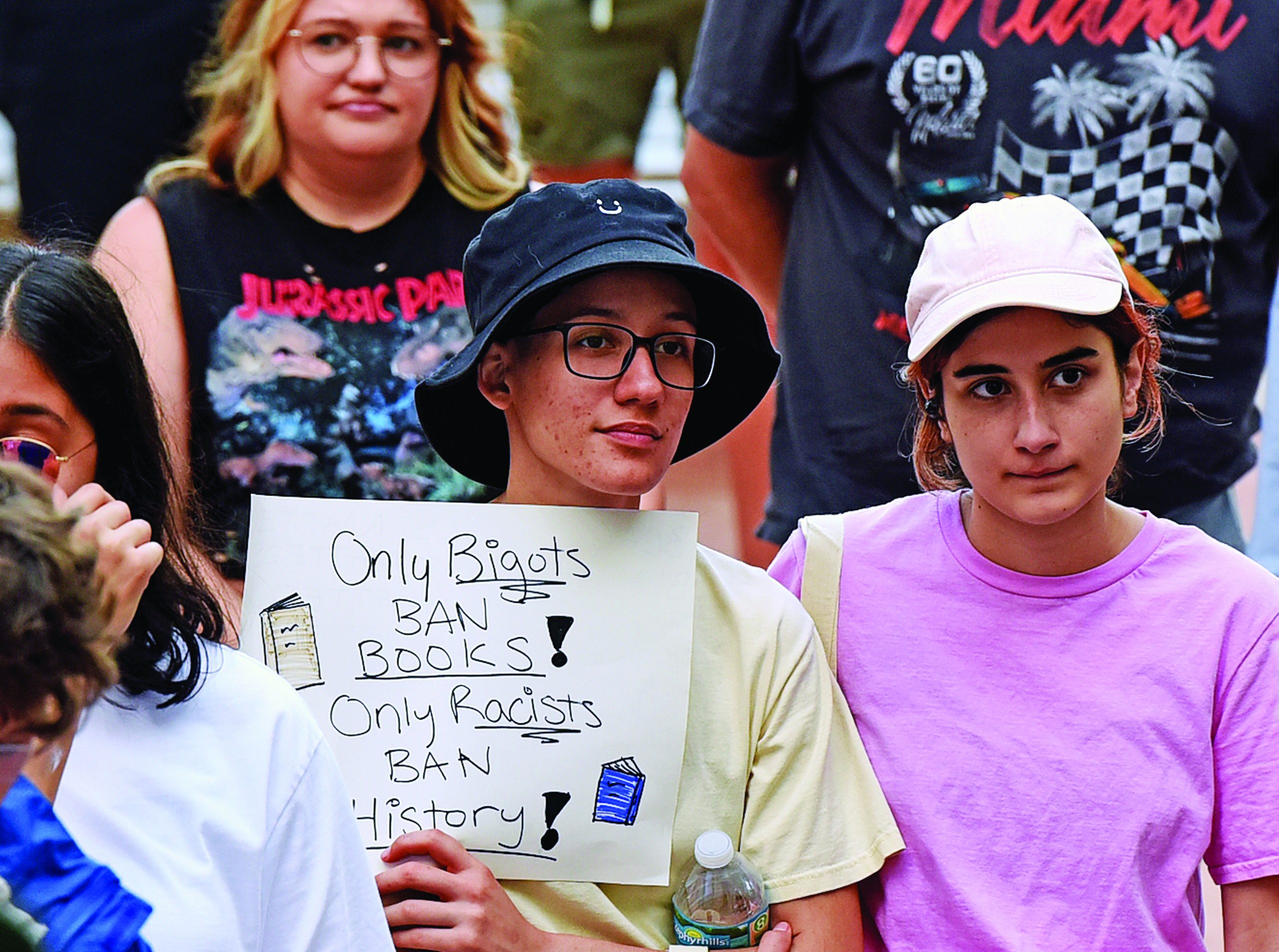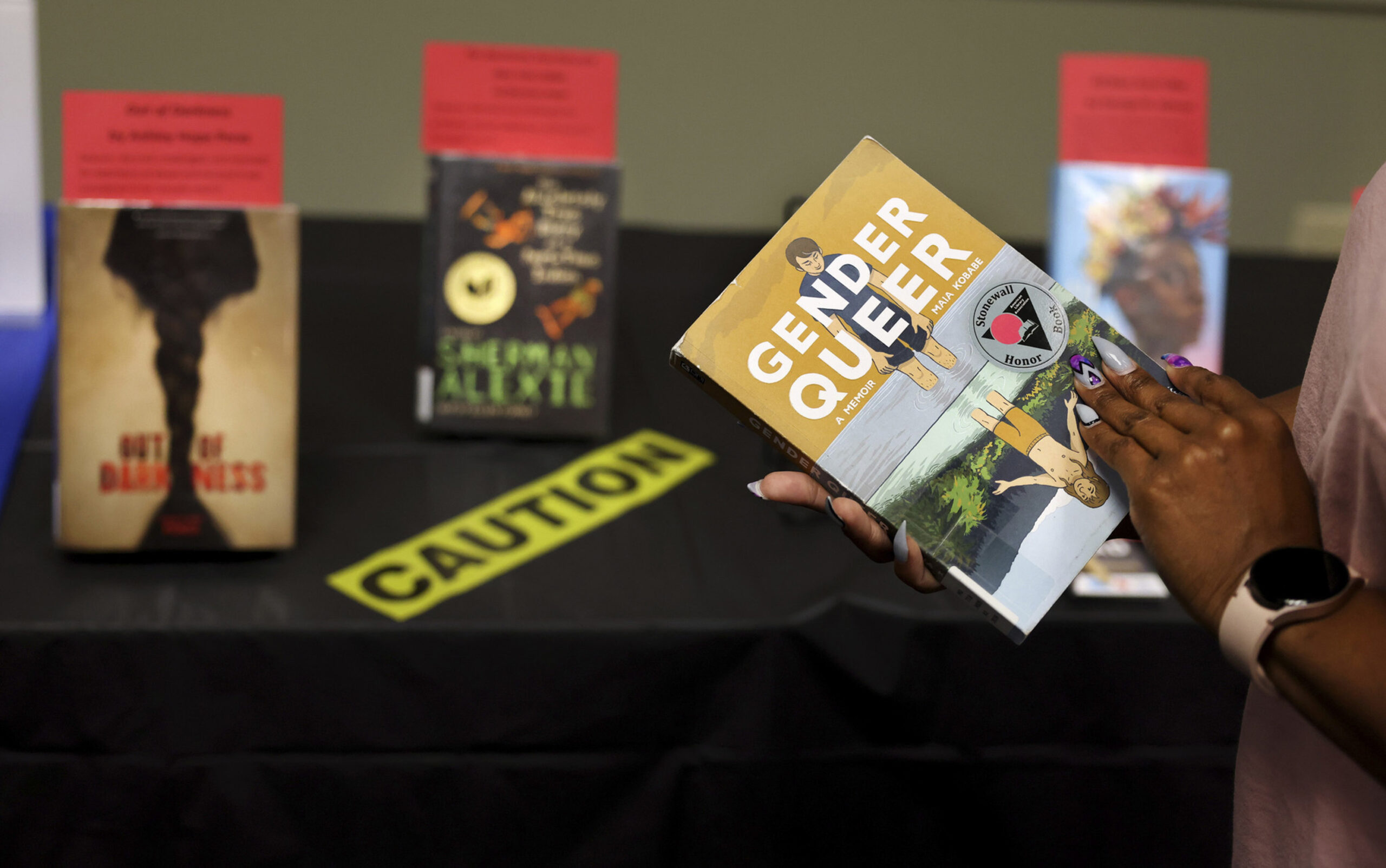“When I use a word,” Humpty Dumpty says in Lewis Carroll’s Through the Looking Glass, “it means just what I choose it to mean — neither more nor less.”
Through the Looking Glass must be a favorite of PEN America, a nonprofit organization that bills itself as standing “at the intersection of literature and human rights to protect open expression in the United States and worldwide.”
To PEN, a “book ban” doesn’t have to mean a “ban” per se, just a decision regarding a book that PEN objects to. Which is why the country seems to be just teeming with them.
PEN America reported that in the 2021-22 school year, 2,532 books were banned, including 1,648 different titles. These bans, the organization reported, “reflect the work of a growing number of advocacy organizations that have made demanding censorship of certain books and ideas in schools part of their mission.”
If readers have paid any attention to politics or legacy media outlets in recent months, they might find themselves nodding along.
“A lot of the recently banned books include stories of change, progress, and stories about communities of color,” Education Secretary Miguel Cardona tweeted last month. “These books hold a lot of history. You cannot erase history, and I will challenge anyone who tries to.”
In his 2024 campaign announcement, President Joe Biden blamed “MAGA extremists” for “banning books,” and the claim has become part of his platform.

“I never thought I’d be a president who is fighting against elected officials trying to ban, and banning, books,” Biden said at an event in April.
The Education Department’s Office for Civil Rights even issued a legally dubious warning to a Georgia school district for creating a “hostile environment” by removing sexually explicit materials from its shelves. On Thursday, the Biden administration took this a step further, unveiling a plan to hire a coordinator in the Education Department to fight book bans in school districts nationwide.
Then there was the Amanda Gorman poem, which brings us back to PEN America’s Through the Looking Glass moment. In late May, it was reported that The Hill We Climb, the poem a 22-year-old Gorman recited at Biden’s inauguration, had been banned from a school in Florida.
“The latest book ban target: Amanda Gorman’s poem from the Biden inauguration,” blared a Vox headline. “Amanda Gorman ‘gutted’ after Florida school bans Biden inauguration poem,” the Guardian said.
There’s just one problem: The poem wasn’t banned at all.
After one mother complained about the poem, the School Materials Review Committee examined the book and decided it was more suited to a middle school reading level than an elementary school one. So the book was moved to the middle school section of the library. There’s no evidence that the move will make the poem more difficult to access for children who are interested in reading it.
Despite the fact that the controversy turned out to be a nothingburger, PEN couldn’t let a good book ban scare go to waste. “Depriving students of exemplary literary works flies in the face of our basic constitutional freedoms,” PEN said in a breathless press release.
Then, doubtless anticipating backlash, it added, “The book may remain available to middle school students, but when you restrict or diminish access to a book, that’s a ban.”
When you restrict or diminish access to a book, that’s a ban. In other words, when I use a word, it means just what I choose it to mean — neither more nor less.
Jay Greene, a senior research fellow in the Center for Education Policy at the Heritage Foundation, calls this the “Humpty Dumpty excuse.” “They’re saying, ‘Banned means whatever we say it means, and as long as we’ve defined it in some methodological appendix, then we’re not lying,’” he told the Washington Examiner. “But they’re deceiving, they’re misleading.”
Most people understand a “book ban” to mean a book has been made impossible to access. Such language conjures up images of Nazi Germany and piles of literature being tossed into roaring fire. “Books are being banned, and history is being rewritten,” Oprah said during a recent commencement speech.
But PEN’s obfuscation aside, these thousands of supposed book bans are simply not real. According to Greene’s research, “74% of the books PEN America identified as banned from school libraries are actually listed as available in the catalogues of those school districts.”

He and research associate Madison Marino reported for Heritage that after scanning through online card catalogs, most of the supposedly banned books were currently available. “In many cases,” they wrote, “we could see that copies of those books are currently checked out and in use by students.”
Claims that dystopian works such as Brave New World have been banned are particularly chilling. But the Aldous Huxley classic and other supposedly banned classics, such as Anne Frank: The Diary of a Young Girl, Lord of the Flies, and To Kill a Mockingbird, were also found to be available in the school districts where PEN said they had been banned.
This still leaves 26% of PEN’s supposedly forbidden books open to the claim that they are, in fact, banned. Color Greene skeptical. He and Marino wrote, “Given how sloppy and error-prone the PEN America report is, it’s unclear whether the books we were unable to find in school district card catalogues had ever been listed and then removed.”
And this isn’t even where PEN’s embellishment ends. When the Gorman story was making its rounds in the news, a Washington Post article reported that “to read the book, an elementary school student would now have to request it from a media specialist and prove that they read at the fifth-grade level, which is the book’s reading level, according to the book’s readability rating.”
Greene said no other media outlet has made such a claim, and he’s skeptical that there is such a requirement. Despite that no other outlet has reported such a process for students looking to read above their grade level, Greene said, “PEN America has hung their hat on this sentence.”
“It’s not a ban, they said,” PEN tweeted. “It just on another shelf, they said. But the truth about the ban on [Gorman’s] book — as is often the case with book banners — was something quite different: An elaborate — & daunting — process for elementary school children simply to access a poem.”
(An email from the Washington Examiner to Miami-Dade County Public Schools requesting clarification went unanswered.)
Even if the description of this process is true — and one would assume that it would also apply to all other books in the middle school section — it certainly isn’t “elaborate” or “daunting.”
Furthermore, according to Snopes, there was no evidence that this change caused difficulty for any children. “In our correspondence with the school district, we received no indication that an elementary-age child would meet resistance from a librarian should they want to walk over to the middle school section of the library to read the works,” it reported.
Snopes also debunks the idea that the poem was moved as some sort of punishment for its content. According to meeting minutes obtained by Snopes, the committee discussing Gorman’s book determined it had “educational value” but vocabulary better suited to older readers.
“The poem ‘The Hill We Climb’ was read at the inauguration of Joe Biden on January 20, 2021,” the minutes said. “Gorman is the youngest poet to read at a presidential inauguration in United States history. For these reasons the SMRC determined the book has educational value because of its historical significance. The vocabulary used in the poem was determined to be of value for middle school students. Therefore, the decision of the SMRC is that the book be shelved in the Middle School Section of the Media Center.”
So, PEN’s claims of a widespread book-banning epidemic seem to be running out of steam. Greene said he’s noticed a tone shift in which politicians refer now to book bans generally rather than directly citing PEN America, as in Cardona’s nebulous hand-wringing over “recently banned books.”
“It’s all gotten very vague, and the reason that it’s gotten vague is when they used to rely upon PEN America’s specifics, they have realized they could be caught saying something false,” he said.
If the book-banning epidemic has been greatly exaggerated and this hyperbole is being used as a cynical ploy by organizations and politicians to drum up support, there’s also another element at play here. Some books, though not nearly as many as have been claimed, are still being banned. What kind of books are they?
Max Eden, a research fellow at the American Enterprise Institute, has examined some of the most-challenged books of the past couple of years. “The books that are actually being removed are plainly pornographic, for the most part,” Eden told the Washington Examiner.
Oft-banned books such as Gender Queer, Lawn Boy, and All Boys Aren’t Blue feature graphic depictions of sex, details of which are unprintable here. “Anybody who’s opposed to so-called book bans will almost never make an affirmative defense of the content itself,” Eden said. “It’s done in terms of, ‘Oh, we think this is disproportionately targeting LGBTQ books, books with authors of a certain race.’ What’s really the case is that parents’ objections are about sexually explicit material.”
A Washington Post analysis found that many of the book challenges are coming from just a few adults. (The Florida mother who challenged Gorman’s book also challenged four others.) Despite the popular framing of the book bans as being racist or anti-LGBT, even the Washington Post admitted, “A stated wish to shield children from sexual content is the main factor animating attempts to remove LGBTQ books.”
“The top reason people challenged books was ‘sexual’ content; 61% of challenges referenced this concern,” the analysis reported. Only 18% mentioned the term “LGBTQ.”
Book bans in the U.S. aren’t seeing a rapid rise akin to Nazi Germany. And parents are mainly concerned about a general uptick in sexual content marketed toward children, LGBT-themed or not. So why does this narrative, that a widespread growth in book bans is harming children and targeting black and gay youth, keep sticking?
“Fighting against book bans polls very well,” Eden said. “When Americans think about book bans, they think about Nazi Germany. It’s a very easy way to rile up the base.”
An analysis from Politico suggested that Biden’s appeal to book bans might be a ploy to win over centrist voters. This works, Eden said, because “it can sometimes be almost impossible to argue against this stuff by pointing out the fact that the material is pornographic — because very frequently you literally cannot do that.”
When Gov. Ron DeSantis (R-FL) in March gave a press conference on the “book ban hoax,” for example, some live feeds cut away after DeSantis began reading excerpts from books whose content was evidently too explicit for all audiences.
“The Democrats and the Biden administration are broadly relying on Americans’ first blush instincts being with them, and not unreasonably so,” Eden explained. “In the abstract, of course, being opposed to book bans polls well. But they’re also counting on Americans never learning what’s actually going on in these schools and what these parents are actually objecting to.”
CLICK HERE TO READ MORE FROM THE WASHINGTON EXAMINER
In the end, the great book ban scare isn’t really about books at all. It’s about maintaining power for activist organizations looking for a new cause and activist politicians looking to appeal to voters in the middle. It doesn’t matter whether the “bans” are justified — or even whether they’re real at all.
“‘The question is,’ said Alice, ‘whether you can make words mean so many different things,’” wrote Carroll in Through the Looking Glass. “‘The question is,’ said Humpty Dumpty, ‘which is to be master’ — that’s all.”
Madeline Fry Schultz is the contributors editor at the Washington Examiner.

